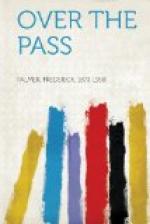“Thank you, Sir Chaps! Now I shall not go back to the desert without having seen a Velasquez. Thank you! And we must be going.”
Jack had an impulse, worthy of the tempestuous buccaneer of the picture, to call to his father to come down; and then to bar the front door until his burning questions were heard. The still light in Mary’s eyes would have checked him, if not his own proper second thought and the fear of precipitating an ungovernable crisis. There had been shadows, real shadows, he was thinking wildly; they were not born of desert imaginings; and out of the quandary of his anguish came only the desire not to part from the Doge and Mary in this fashion! No, not until in some way equilibrium of mind was restored.
Though he knew that they did not expect or want his company, he went out into the street with them. He would go as far as their hotel, he remarked, in the bravery of simulated ease. The three were walking in the same relative positions that they had before, with the Doge’s bulk hiding Mary from Jack’s sight. The Doge set a rapid pace, as if under the impetus of a desire to escape from the neighborhood of the Wingfield house.
“Well, Sir Chaps,” he said, after a while, “it will be a long time before the provincials come to New York again. Why, in this New York you can spend a patrimony in two weeks”—this with an affected amusement at his own extravagance—“and I’ve pretty nearly done it. So we fly from temptation. Yes, Mary, we will take the morning train.”
“The morning train!” Mary exclaimed; and her surprise left no doubt that her father’s decision was new to her. Was it due to an exchange of glances between a stark face and a face crimson with indignation which Jack had already connected with the working out of his own destiny?
“Yes, that is better than spending our orange crop again!” she hastened to add, with reassuring humor. “I’m fairly homesick for our oasis.”
“We’ve had our fill of the big city,” said the Doge, feelingly, “and we are away to our little city of peace where we turned our pasts under with the first furrows in the virgin soil.”
Then silence. The truce of nonsense was dead. Persiflage was dead. Jack was as a mute stranger keeping at their side unasked, while the only glimpse he had of Mary was the edge of her hat and her fingertips on her father’s sleeve. Silence, which he felt was as hard for them as for him, lasted until they were at the entrance to the quiet little hotel on a cross-town street where the Ewolds were staying; and having the first glimpse of Mary’s eyes since they had started, he found nothing fathomable in them except unmistakable relief that the walk was over.
“Thank you for showing me the Velasquez,” said the Doge.
“Thank you, Jack,” Mary added.
Both spoke in a manner that signaled to him the end of all things, but an end which he could not accept.




